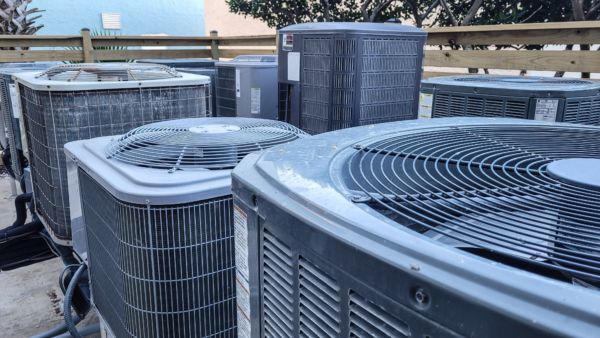What Size AC Unit Do I Need for My Florida Home?
January 03, 2025

It's no secret that you need an air conditioner to weather Florida's scorching climate, but many homeowners find themselves asking, "What size AC unit do I need?" AC sizing can be tricky, but getting it right ensures your system runs more efficiently, reducing wear and tear and cutting down on your energy bills.
However, sizing depends on many factors. With that in mind, let's look at everything you need to know, including:
- Why proper air conditioner sizing matters
- Key factors to consider for Florida homes
- How to calculate air conditioner size for a house
- Additional considerations when choosing an air conditioner
- Professional installation vs. DIY
After reading our guide, you'll feel confident about your AC installation.
Get Your Free AC Installation Estimate Today
Hire the HVAC company that knows Southwest Florida best. When you book your AC installation through Advanced Air, our honest and professional technicians will discuss your needs to help you choose the best system. We offer free estimates on all new installations.
Why Proper Air Conditioner Sizing Matters
Incorrect air conditioner sizing carries a few consequences. The most immediate and frustrating of these is when a smaller AC takes a long time to cool your home. However, a larger-than-necessary unit also causes problems, such as water leaking when it doesn't cycle long enough to dehumidify air passing over the evaporator coils.
Get AC sizing right and you not only avoid these types of issues but also benefit from:
- Reduced energy bills
- Improved room comfort
- Longer AC lifespan
- Reduced noise
- Improved humidity control
Key Factors to Consider for Florida Homes
So, what size AC do you need for a Florida home? Unfortunately, there's no straightforward answer, as many things factor into sizing.
Florida's hot and humid climate already tends to require a slightly larger unit than homes in other regions. Most AC systems also run for long periods all year round in Florida, so it's important to choose a system that won't cycle too long, leading to a shortened lifespan.
In addition to these factors, you should also consider:
- Home Size: Larger homes require increased cooling.
- Insulation: Poorly insulated homes don't regulate temperatures as effectively.
- Activities: Cooking often or running certain appliances can warm your home, increasing cooling needs.
How to Calculate Air Conditioner Size for a House
When sizing an air conditioner, you'll run into two main energy measurements: British Thermal Units and tons. BTU measures how much heat an AC can remove from a space in an hour, and 12,000 BTUs equates to 1 ton when deciding on AC sizing.
When it comes to how to calculate air conditioner sizing for a house, the easiest calculation method is to add 1 ton for every 500 square feet of floor area. This means a 2,000-square-foot home would require a 4-ton AC (equivalent to 48,000 BTUs). If your home has ceilings higher than 8 feet, add another 25% cooling requirement for each additional foot.
However, air leakage, home shape, and insulation affect calculation accuracy. HVAC technicians use much more complex formulas, such as the Manual J Load Calculation. A lot goes into this formula, so it's worth hiring a professional to do a home assessment for accurate AC planning.
Additional Considerations When Choosing an Air Conditioner
Make sure to consider a few additional things before settling on your new air conditioner. SEER ratings are one of these, as Florida laws require new AC systems to have a minimum SEER rating of 15.
You also have a choice between central and ductless air conditioners. Central cools your whole home but requires ductwork. Ductless air conditioners cool single rooms, so you'll need one for each space if you go that route.
Professional Installation vs. DIY
When considering the risk of safety hazards, component failure, and building code violations, DIY installation can be costly. Professional HVAC technicians not only know how to size your AC correctly but will also ensure the installation doesn't invalidate your warranty or lead to increased wear and tear.
Overall, it's best to trust things to a qualified technician with proven credentials. That's why we make things easy for you with certified HVAC experts and transparent estimates.
Discover Our AC Installation Services
Book your AC installation with Southwest Florida's most skilled HVAC technicians. We've earned thousands of 5-star reviews by helping homeowners like yourself choose the best air conditioners for their homes.
- Posted in:
- Air Conditioner

